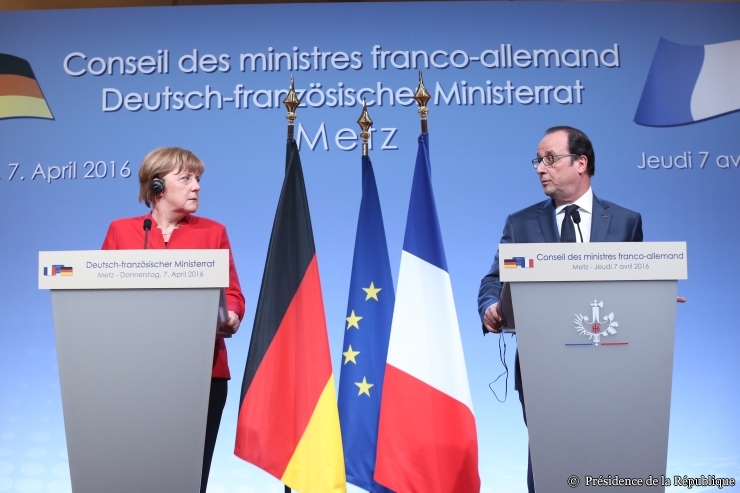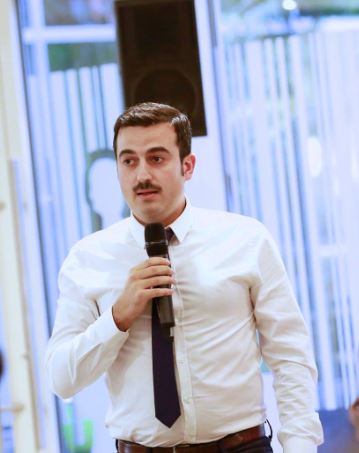Chladnúce francúzsko-nemecké vzťahy
7. apríla sa uskutočnila 17. konferencia vMetzi (Alsasko,Moselle), meste nachádzajúcom sa v strede francúzsko-nemeckých vzťahov, kde sa symbolicky stretli vlády týchto dvoch štátov. O tomto kúsku zeme dlho viedli spory a dodnes predstavuje symbol mieru medzi týmito krajinami.
Riešili sa kľúčové záležitosti, ktoré súvisia s utečeneckou krízou a hrozbou terorizmu; záležitosti, na ktoré majú obe krajiny rozdielne názory. Taktiež sa diskutovalo o ich ďalšej vzájomnej spolupráci v oblasti rastu, zamestnanosti, kultúrnych a lingvistických výmen a podpory mobility mladých.
Skôr symbolické stretnutie
Aj napriek závažnosti diskutovaných tém, zasadnutie vlády nikam nepokročilo. V otázke migrácie nevzišlo žiadne komplementárne riešenie dohody medzi Tureckom a EÚ, hoci problém prílivu utečencov má ďaleko od jeho reálneho riešenia. Riešením by mohlo byť zriadenie európskej pohraničnej a pobrežnej stráže, usmerňujúc tak prichádzajúcich migrantov, vzhľadom na vyhovenie ich práva na azyl. Táto hodnota by mala byť uznávaná všetkými členskými štátmi EÚ.
V rozhodujúcej otázke terorizmu nastal výrazný progres, vďaka nedávnemu prijatiu smernice o využívaní údajov z osobných záznamov o cestujúcich, čo je v podstate zjednodušené znenie obhajované Alianciou liberálov a demokratov pre Európu. Francúzsko a Nemecko spolu s ďalšími členskými štátmi sa príliš nepokúšali o spoločnú a efektívnu odpoveď na hrozbu terorizmu. O posilnení a rozšírení privilégií Europolu sa vôbec nediskutovalo, napriek faktu, že slabiny v spravodajskej službe a polícii nesú jednoznačnú zodpovednosť za útoky v rokoch 2015 a 2016.
V prípade, že by sa Francúzsko a Nemecko zaviazali k ďalšej spolupráci v rôznych oblastiach a francúzsko-nemecký výbor pre integráciu by sa postavil čelom k výzve integrácie utečencov, situácia Európy by sa výrazne zlepšila. Zatiaľ však ani v otázke spolupráce krajín vo vytváraní príležitostí pre mladých ľudí neuzniesli žiadne závažnejšie záväzky, hoci táto otázka predstavuje kľúčovú tému pre budúce európske generácie. Zdá sa, že naďalej pretrváva nedorozumenie zapríčinené francúzskym negatívnym rozhodnutím vypustiť z učebných osnov dvojjazyčné vzdelávanie, umožňujúce žiakom študovať nielen v anglickom, ale aj v nemeckom jazyku.
Pre Francúzsko a Nemecko nastal čas obhájiť svoje záväzky
Nie je správne považovať stagnáciu tohto bilaterálneho vzťahu za problematický iba pre Francúzsko a Nemecko. Ich demografie, ekonomiky, politiky a štatúty zakladajúcich členov ich nanešťastie ešte stále do veľkej miery predurčujú na ťahúňov medzivládnej Európy. Ich rozpor, či lepšie povedané – vzájomný nedostatok záujmu, momentálne predstavuje veľmi škodlivý aspekt pre celú Európu, ktorá čelí existenčnej kríze. Práve teraz je vhodný čas pre národné vlády, najmä pre Francúzsko a Nemecko, prevziať zodpovednosť a obhajovať všeobecne potrebné záväzky. No s celoštátnymi voľbami v oboch krajinách na obzore, táto predstava ostáva nepravdepodobná.
Tristan ATMANIA (@ATMANIATristan)



